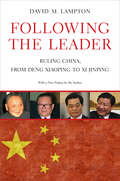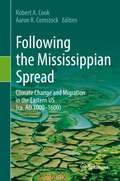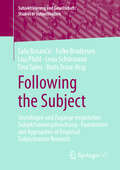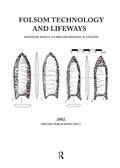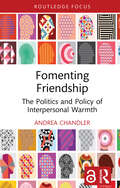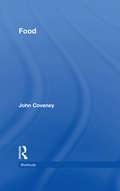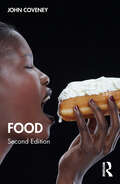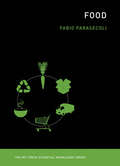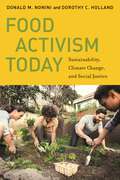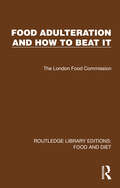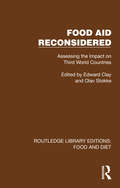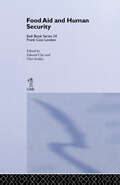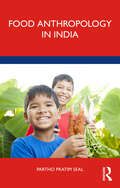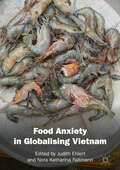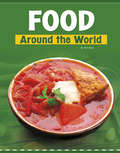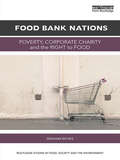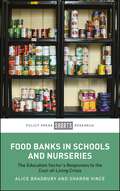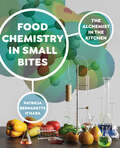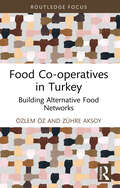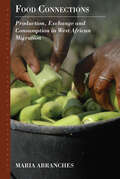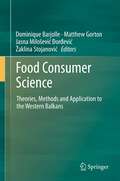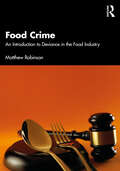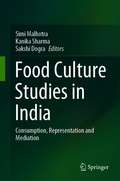- Table View
- List View
Following the Leader: Ruling China, from Deng Xiaoping to Xi Jinping
by David M. LamptonWith unique access to Chinese leaders at all levels of the party and government, best-selling author David M. Lampton tells the story of China’s political elites from their own perspectives. Based on over five hundred interviews, Following the Leader offers a rare glimpse into how the attitudes and ideas of those at the top have evolved over the past four decades. Here China’s rulers explain their strategies and ideas for moving the nation forward, share their reflections on matters of leadership and policy, and discuss the challenges that keep them awake at night. As the Chinese Communist Party installs its new president, Xi Jinping, for a presumably ten-year term, questions abound. How will the country move forward as its explosive rate of economic growth begins to slow? How does it plan to deal with domestic and international calls for political reform and to cope with an aging population, not to mention an increasingly fragmented bureaucracy and society? In this insightful book we learn how China’s leaders see the nation’s political future, as well as about its global strategic influence.
Following the Mississippian Spread: Climate Change and Migration in the Eastern US (ca. AD 1000-1600)
by Robert A. Cook Aaron R. ComstockThis book is the first to specifically trace the movement of Mississippian maize farmers throughout the US Midwest and Southeast. By providing a backdrop of shifting climatic conditions during the period, this volume also investigates the relationship between farmers and their environments. Detailed regional overviews of key locations in the Mississippi Valley, the Ohio Valley, and the peripheries of the Mississippian culture area reveal patterns and variation in the expression of Mississippian culture and interactions between migrants and local communities. Methodologically, the case studies highlight the strengths of integrating a variety of data sets to identify migration. The volume provides a broader case study of the links between climate change, migration, and the spread of agriculture that is relevant to archaeologists and anthropologists studying early agricultural societies throughout the world. Key patterns of adaptation to and mitigation of the effects of droughts, for example, provide a framework for understanding the options available to societies in the face of climate change afforded by the time-depth of an archaeological perspective.
Following the Subject: Grundlagen und Zugänge empirischer Subjektivierungsforschung - Foundations and Approaches of Empirical Subjectivation Research (Subjektivierung und Gesellschaft/Studies in Subjectivation)
by Tina Spies Saša Bosančić Boris Traue Folke Brodersen Lisa Pfahl Lena SchürmannDie Subjektivierungsanalyse verbindet gesellschafts- und sozialtheoretische Reflektionen moderner Selbst- und Weltverhältnisse mit empirischen Analysen zur Wechselwirkung von Subjekten und ihren Subjektivierungsinstanzen. Im Zentrum steht die Frage, wie die von der Gesellschaft hervorgebrachten Subjekte auf das gegenwärtige Subjektivierungsgeschehen einwirken und es bestimmen (können). Der Band führt in theoretische Grundlagen ein, stellt methodische Ansätze vor und diskutiert Potentiale empirisch begründeter Theoriebildung zur Subjektivierung in Gegenwartsgesellschaften. Subjectivation research explores the relationship amongst social theory, reflections of the modern self, and empirical analyses of subject formations. Drawing on these empirical analyses of interactions between subjects and instances of subjectivation, this volume highlights how subjects can ‘talk back’. Readers are introduced to theoretical foundations, methodological approaches as well as empirically based theories on subjectivation in contemporary societies.
Folsom Prison (Images of America)
by Jim BrownFolsom Prison is California's second-oldest prison, dating back to 1880. In the decades following the Gold Rush, it housed some of the state's most notorious prisoners in stone, dungeon-like cells behind solid-metal doors; was the first prison with electric power; and for many years provided labor for various state projects, including construction, fabrication, and printing of license plates. Thrust into the public consciousness in the 1960s by high-profile performances from country music's Johnny Cash, the prison remains a notorious and legendary institution. The variety of offenders housed at Folsom are incarcerated for a large gamut of criminal behavior, and the California Department of Corrections has been dedicated to rehabilitation efforts throughout the facility's long history.
Folsom Technology and Lifeways
by John E. Clark; Michael B. CollinsThis volume is an extensive collection of chapters discussing Folsom artifacts and sites, as well as innovative experiments undertaken to understand Folsom technology and lifeways. Public and private collections of Folsom artifacts were brought together with professional and amateur lithic analysts and knappers in an attempt to determine how the ancient stone tools were made and used. In addition, Folsom Technology and Lifeways summarizes interaction among knappers and analysts, and the attempts to replicate specific artifact types represented. It is a unique volume in that it examines the variation present in technology and behavior across a wide range of Folsom localities.
Fomenting Friendship: The Politics and Policy of Interpersonal Warmth (Routledge Research in Comparative Politics)
by Andrea ChandlerIn studies of comparative politics and public policy specifically, interpersonal friendship has been generally regarded as a matter that belongs to the private domain, rather than a site for government intervention. And yet, friendship is inherently political. While friendships can and do evolve spontaneously between individuals, political factors can help to bring people together or drive them apart.Fomenting Friendship examines the ways in which friendship has been perceived in comparative politics, and the barriers to friendship that exist in capitalist society. These barriers, Andrea Chandler contends, have been shaped by government policy. Reviewing the abundant evidence that shows that access to friendship is socially determined, and that a lack of access to friendship disadvantages the individual in numerous ways, Chandler effectively makes the case that government has a role to play in encouraging interpersonal friendship, including calling upon politicians to model friendly and inclusive behaviour in public.This book is a natural resource for all those looking for answers and best policy practices for encouraging friendship and uncovering unanswered questions about friendship.The Open Access version of this book, available at www.taylorfrancis.com, has been made available under a Creative Commons Attribution-Non Commercial-No Derivatives (CC-BY-NC-ND) 4.0 license.Funding for the Open Access has been provided by the Department of Political Science, Carleton University.
Food
by John CoveneyThe centrality of food in life, and the importance of food as life, is undeniable. As a source of biological substrates, personal pleasure and political power, food is and has been an enduring requirement of human biological, social and cultural existence. In recent years, interest in food has increased across the academic, public and popular spheres, fuelled by popular media’s constant play on the role of food and body size, and food and cooking, as a mass spectacle for TV audiences. In Food, a new book part of the Shortcuts Series, John Coveney examines ‘food as…’ humanness, identity, politics, industry, regulation, the environment and justice. He explores how food helps us understand what it means to be human. Through food, we construct our social identities, our families and communities, but this book also highlights the tensions between the industrialisation of food, the environment, and the fair (or otherwise) worldwide distribution of food. It considers how the food industries, on which most of us have to rely, have also had direct effects on our bodies – whether through diet and longevity, or the development of illness and diseases. This book is for all students and general readers alike – or for anyone with a fascination with food. It questions the idea that food is merely something inert on the plate, and instead shows how influential, symbolic, powerful and transformative food has come to be. This book is part of the Shortcuts series published by Routledge, a major new series of concise, accessible introductions to some of the major issues of our times.
Food (Shortcuts Ser.)
by John CoveneyIn Food, John Coveney examines ‘food as … ’ identity, politics, industry, regulation, the environment, justice and gastronomy. He explores how food helps us understand what it means to be human. The centrality of food in life, and the importance of food as life, is undeniable. As a source of biological substrates, personal pleasure and political power, food is and has been an enduring requirement of human biological, social and cultural existence. In recent years, interest in food has increased across the academic, public and popular spheres, fuelled by popular media’s constant play on the role of food and body size, and food and cooking, as a mass spectacle for TV audiences. Through food, we construct our social identities, our families and communities. However, Coveney also highlights the tensions between the industrialisation of food, the environment, and the iniquitous distribution of food. He also considers how the food industries, on which most of us must rely, have also had direct effects on our bodies through diet, and the development of illness and diseases. This accessible primer is for students and general readers alike, indeed, for anyone with an interest in food. It questions the idea that food is merely something inert on the plate. Instead, it shows how influential, symbolic, powerful and transformative food has come to be.
Food (The MIT Press Essential Knowledge Series)
by Fabio ParasecoliA consumer's guide to the food system, from local to global: our part as citizens in the interconnected networks, institutions, and organizations that enable our food choices. Everybody eats. We may even consider ourselves experts on the topic, or at least Instagram experts. But are we aware that the shrimp in our freezer may be farmed and frozen in Vietnam, the grapes in our fruit bowl shipped from Chile, and the coffee in our coffee maker grown in Nicaragua, roasted in Germany, and distributed in Canada? Whether we know it or not, every time we shop for food, cook, and eat, we connect ourselves to complex supply networks, institutions, and organizations that enable our food choices. Even locavores may not know the whole story of the produce they buy at the farmers market. In this volume in the MIT Press Essential Knowledge series, food writer and scholar Fabio Parasecoli offers a consumer's guide to the food system, from local to global.Parasecoli describes a system made up of open-ended, shifting, and unstable networks rather than well-defined chains; considers healthy food and the contradictory advice about it consumers receive; discusses food waste and the implications for sustainability; explores food technologies (and “culinary luddism”); and examines hunger and food insecurity in both developing and developed countries. Parasecoli reminds us that we are not only consumers but also citizens, and as citizens we have more power to improve the food system than we do by our individual food choices.
Food Activism Today: Sustainability, Climate Change, and Social Justice (Social Transformations in American Anthropology #6)
by Dorothy C. Holland Donald M. NoniniIlluminates how food activism has been taking shape and where it is headedAs climate change, childhood obesity, and food insecurity accelerate at an alarming pace, activists around the country are working to address the pressing need for healthy and sustainable solutions to feed the population. Food Activism Today investigates the new approaches food activists are taking as they formulate alternatives to the current unsustainable agro-industrial food system.Drawing on ethnographic research conducted over an eleven-month period in both urban and rural North Carolina, the volume addresses questions about the moral visions of food activists, how class and racial hierarchies infuse some food activism movements, and how food activism relates to climate change and imminent ecological collapse. Exploring food activism around both local and sustainable food production and food security for lower-income people, the volume finds surprisingly little overlap, with the two movements seemingly remaining distinct approaches (at least for now) to issues around the food system, climate change, and access to healthy food choices.As the US moves into an era in which climate change and neoliberal tensions are conjoined in a looming political crisis, Food Activism Today looks at where food activism is headed, the ethics and issues surrounding alternative approaches to food production, and how food production is related to broader issues of climate change.
Food Adulteration and How to Beat It (Routledge Library Editions: Food and Diet)
by The London Food Commission‘All natural: no artificial colours or flavours’. This was an increasingly familiar claim made for the food we bought in the late 1980s. But what about the other ingredients? Additives are only one form of adulteration. Nitrates, excess water, pesticide residues, too much fat, and the newest of them all food irradiation, are some of the others. The questions they pose for all of us are inescapable, as is the overall issue of poor-quality food dressed up to be what it is not.In this book, originally published in 1988, the London Food Commission, Britain’s independent food watchdog, spells out the dangers, and suggests solutions. It challenges official policy and condemns official secrecy. It says why British food is the sick food of Europe. It believes that what is needed is a major shake-up in Whitehall and the food trades, and calls for a new anti-adulteration alliance – a positive campaign for improved food policy. And it backs all arguments with rigorous and detailed evidence.Food matters to everyone. We deserve the best. We will only get it if we demand it. This book spelt out what our demands should be. Still a big topic of interest today this is an opportunity to look at some early issues surrounding the food we buy and assess how far we’ve come.
Food Aid Reconsidered: Assessing the Impact on Third World Countries (Routledge Library Editions: Food and Diet)
by Olav Stokke Edward ClayFood aid continues to be a high profile, and perhaps the most controversial form of aid. Food Aid Reconsidered: Assessing the Impact on Third World Countries, originally published in 1991, which concentrates on recent experience, especially in Sub-Saharan Africa, provided a stocktaking on the state of the debate and the contribution that economics and other social sciences had made to resolving many of the controversies surrounding food aid at the time. These issues include the gap between the potential and actual contribution of food aid on food security and agricultural production in developing countries, European dairy aid to India and possible alternatives to exporting food from developed countries for providing humanitarian assistance to hungry people. Today it can be read in its historical context.
Food Aid and Human Security (Routledge Research EADI Studies in Development #No. 24)
by Olav Schram Stokke Edward ClayFood aid is historically a major element of development aid to support longer-term development, and the primary response to help countries and peoples in crisis. This examination of food aid focuses in particular on institutional questions.
Food Allergy Advocacy: Parenting and the Politics of Care
by Danya GlabauA detailed exploration of parents&’ fight for a safe environment for their kids, interrogating how race, class, and gender shape health advocacy The success of food allergy activism in highlighting the dangers of foodborne allergens shows how illness communities can effectively advocate for the needs of their members. In Food Allergy Advocacy, Danya Glabau follows parents and activists as they fight for allergen-free environments, accurate labeling, the fair application of disability law, and access to life-saving medications for food-allergic children in the United States. At the same time, she shows how this activism also reproduces the culturally dominant politics of personhood and responsibility, based on an idealized version of the American family, centered around white, middle-class, and heteronormative motherhood.By holding up the threat of food allergens to the white nuclear family to galvanize political and scientific action, Glabau shows, the movement excludes many, including Black women and disabled adults, whose families and health have too often been marginalized from public health and social safety net programs. Further, its strategies are founded on the assumption that market-based solutions will address issues of social exclusion and equal access to healthcare. Sharing the personal experiences of a wide spectrum of people, including parents, support group leaders, physicians, entrepreneurs, and scientists, Food Allergy Advocacy raises important questions about who controls illness activism. Using critical, intersectional feminism to interrogate how race, class, and gender shape activist priorities and platforms, it shows the way to new, justice-focused models of advocacy.
Food Anthropology in India
by Partho Pratim SealThis book explores food in India and its evolution from prehistoric times to contemporary food trends while highlighting the intersections between culture, rituals, environment, and the economy with food, ingredients, and eating practices. It looks at the history of food and food preferences in India by studying historical, medicinal, and religious texts. The book analyses preferences and taboos from social, anthropological, cultural, political, and economic perspectives, mapping how food practices influence and are influenced by religion, production and distribution, ecology, and social class. It also examines consumption practices, problems with food production, agricultural distress, food and farming reforms, globalisation of food, the adoption of sustainable practices, and the future of farming, diets, and eating. Engaging and comprehensive, this book will be an essential read for scholars and researchers of anthropology, social and cultural anthropology, sociology, cultural studies, political studies, development studies, and food studies.
Food Anxiety in Globalising Vietnam
by Judith Ehlert Nora Katharina FaltmannThis open access book approaches the anxieties inherent in food consumption and production in Vietnam. The country’s rapid and recent economic integration into global agro-food systems and consumer markets spurred a new quality of food safety concerns, health issues and distrust in food distribution networks that have become increasingly obscured. This edited volume further puts the eating body centre stage by following how gendered body norms, food taboos, power structures and social differentiation shape people’s ambivalent relations with food. It uncovers Vietnam’s trajectories of agricultural modernisation against which consumers and producers manoeuvre amongst food self-sufficiency, security and abundance.Food Anxiety in Globalising Vietnam is explicitly about ‘dangerous’ food – regarding its materiality and meaning. It provides social science perspectives on anxieties related to food and surrounding discourses that travel between the local and the global, the individual and society and into the body. Therefore, the book’s lens of food anxiety matters for social theory and for understanding the embeddedness and discontinuities of food globalizations in Vietnam and beyond. Due to its rich empirical base, methodological approaches and thematic foci, it will appeal to scholars, practitioners and students alike.
Food Around the World (Customs Around the World)
by Wil MaraTime to eat! Your meal might be sweet or salty. It might have lots of meat or lots of vegetables. Discover what foods people around the world enjoy in this engaging series that develops kids' understanding of our diverse global community and their place in it.
Food Bank Nations: Poverty, Corporate Charity and the Right to Food (Routledge Studies in Food, Society and the Environment)
by Graham RichesIn the world’s most affluent and food secure societies, why is it now publicly acceptable to feed donated surplus food, dependent on corporate food waste, to millions of hungry people? While recognizing the moral imperative to feed hungry people, this book challenges the effectiveness, sustainability and moral legitimacy of globally entrenched corporate food banking as the primary response to rich world food poverty. It investigates the prevalence and causes of domestic hunger and food waste in OECD member states, the origins and thirty-year rise of US style charitable food banking, and its institutionalization and corporatization. It unmasks the hidden functions of transnational corporate food banking which construct domestic hunger as a matter for charity thereby allowing indifferent and austerity-minded governments to ignore increasing poverty and food insecurity and their moral, legal and political obligations, under international law, to realize the right to food. The book’s unifying theme is understanding the food bank nation as a powerful metaphor for the deep hole at the centre of neoliberalism, illustrating: the de-politicization of hunger; the abandonment of social rights; the stigma of begging and loss of human dignity; broken social safety nets; the dysfunctional food system; the shift from income security to charitable food relief; and public policy neglect. It exposes the hazards of corporate food philanthropy and the moral vacuum within negligent governments and their lack of public accountability. The advocacy of civil society with a right to food bite is urgently needed to gather political will and advance ‘joined-up’ policies and courses of action to ensure food security for all.
Food Banks in Schools and Nurseries: The Education Sector’s Responses to the Cost-of-Living Crisis
by Alice Bradbury Sharon VinceAvailable Open Access digitally under CC-BY-NC-ND licence. During the cost-of-living crisis, schools and nurseries have had to step beyond their educational purpose to offer free food to families through food banks. This book explores how these food banks operate, why families use them and how they affect children’s participation and wellbeing. Drawing on case studies of 12 primary schools and early years settings across England, it examines the impact on family wellbeing, home-school relationships and staff. The authors argue that the situation will remain unsustainable if this welfare work continues to be unfunded and unrecognised, raising a significant question of who should and who can be responsible for alleviating child poverty.
Food Chemistry in Small Bites: The Alchemist in the Kitchen
by Patricia B O'HaraFood Chemistry in Small Bites takes readers on an up-close scientific journey through the transformation of food when meals are prepared. Organized in bite-size, digestible units, this innovative text introduces students to food's molecular makeup as well as the perception of food by the five senses. Using familiar foods as examples, it explores what happens to ingredients when heated, cooled, or treated and also considers what happens when materials that don’t naturally mix are forced to do so. With informative, full-color renderings and a hands-on lab section, the book encourages students to think like scientists while preparing delicious dishes. Readers will formulate hypotheses as to why certain foods taste hot despite being at room temperature, why milk separates into curds and whey when lemon is added, and other ordinary but chemically complex phenomena. This book also importantly challenges readers to think critically about the future of food in the face of a warming planet.
Food Co-operatives in Turkey: Building Alternative Food Networks (Routledge Focus on Environment and Sustainability)
by Özlem Öz Zühre AksoyThis book addresses the roles played by food co-operatives in the attempt to build alternative food networks, drawing on an in-depth analysis of case studies in Turkey. While many existing studies focus on food co-operatives and alternative food networks in the Global North, this book provides an important insight into a country from the Global South and, in doing so, not only provides a novel perspective but also challenges the rigid North–South categorization. The book provides a rounded view by examining both a producer and a consumer co-operative: BÜKOOP is a university-based consumer food co-operative, and the Vakıflı co-operative is a food-producing co-operative located in the Hatay province on the Mediterranean coast of Turkey. These two co-operatives, which have been working together for more than ten years, share the dream of establishing a network of co-operatives, in which producers exist in solidarity with consumers, blurring the dichotomy of producer versus consumer as well as rural versus urban. In addition to contributing towards a better understanding of the urban–rural divide, within the framework of alternative food networks, the in-depth analysis of these two cases enables us to explore how food co-operatives develop and how they keep their commitment to their original goals and ideals so as to help build an alternative food system. The lessons we learn from these two working case examples highlight the successes and areas of improvement for food co-operatives. They also provide evidence against the pessimism about alternative food networks by demonstrating that co-operatives can democratize both production and consumption. This book will be of interest to students and scholars studying alternative food networks, food justice, food sovereignty, transformation towards sustainable food systems, social movements, and the urban–rural divide.
Food Connections: Production, Exchange and Consumption in West African Migration (Anthropology of Food & Nutrition #10)
by Maria AbranchesFood Connections follows the movement of food from its production sites in West Africa to its final spaces of consumption in Europe. It is an ethnographic study of economic and social life amongst a close-knit community of food producers, traders and consumers and a wide range of small intermediaries that operate in Guinea-Bissau and Portugal. By investigating the way meanings of food and land are embedded in everyday experiences and relationships in the various phases of the movement, on both sides of the migration, it reveals the connections that transnational processes of food production, exchange and consumption generate between two lifeworlds.
Food Consumer Science
by Dominique Barjolle Jasna Milošević Đorđević Žaklina Stojanović Matthew GortonThis book explores the main methods, models, and approaches of food consumer science applied to six countries of the Western Balkans, illustrating each of these methods with concrete case studies. Research conducted between 2008 and 2011 in the course of the FOCUS-BALKANS project forms an excellent database for exploring recent changes and trends in food consumption.
Food Crime: An Introduction to Deviance in the Food Industry
by Matthew RobinsonThis book addresses the various forms of deviance and criminality found within the conventional food system. This system—made up of numerous producers, processors, distributors, and retailers of food—has significant, far-reaching consequences bearing upon the environment and society.Food Crime broadly outlines the processes and impacts of this food system most relevant for the academic discipline of criminology, with a focus on the negative health outcomes of the US diet (e.g., obesity and diabetes) and negative outcomes associated with the system itself (e.g., environmental degradation). The author introduces the concept of "food criminology," a new branch of criminology dedicated to the study of deviance in the food industry. Demonstrating the deviance and criminality involved in many parts of the conventional food system, this book is the first to provide exhaustive coverage of the major issues related to what can be considered food crime. Embedded in the context of state-corporate criminality, the concepts and practices exposed in this book bring attention to harms associated with the conventional food system and illustrate the degree of culpability of food companies and government agencies for these harms.This book is of interest to students, scholars, and practitioners seeking a more just and healthy food system and encourages further future research into food crimes in the disciplines of criminology, criminal justice, and sociology.
Food Culture Studies in India: Consumption, Representation and Mediation
by Kanika Sharma Simi Malhotra Sakshi DograThis book discusses food in the context of the cultural matrix of India. Addressing topical issues in food and food culture, it explores questions concerning the consumption, representation and mediation of food. The book is divided into four sections, focusing on food fads; food representation; the symbolic valence of food; modes and manners of resistance articulated through food. Investigating consumption practices in both public and ethnic culture, each chapter introduces a fresh approach to food across diverse literary and cultural genres. The book offers a highly readable guide for researchers and practitioners in the field of literary and cultural studies, as well as the sociological fields of food studies, body studies and fat studies.
